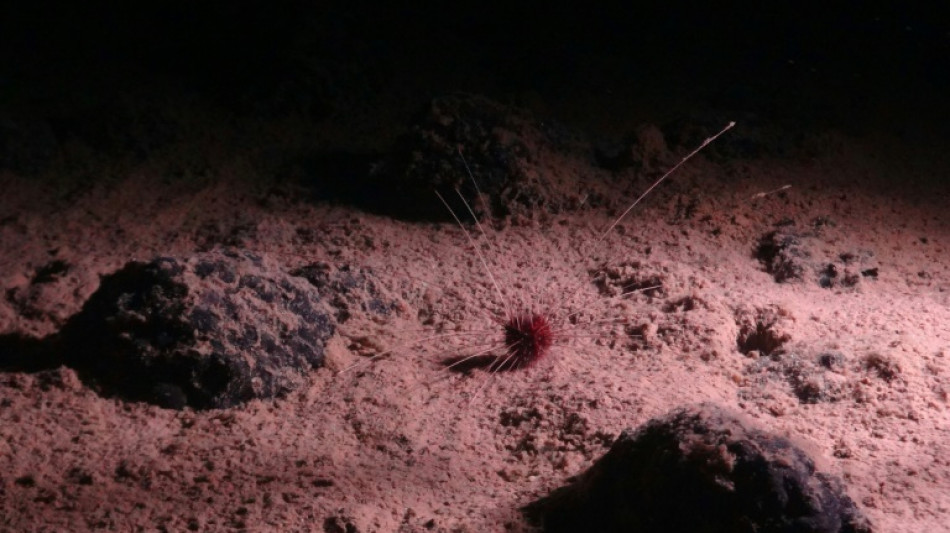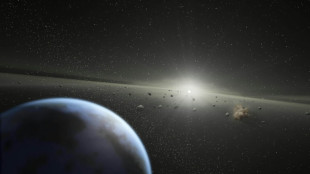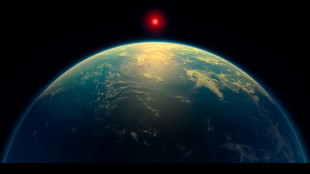
-
 Migrant's expulsion puts Washington Salvadorans on edge
Migrant's expulsion puts Washington Salvadorans on edge
-
Plan for expanded Muslim community triggers hope, fear in Texas

-
 Pakistan foreign minister due in Kabul as deportations rise
Pakistan foreign minister due in Kabul as deportations rise
-
White House touts Covid-19 'lab leak' theory on revamped site

-
 Dodgers star Ohtani skips trip to Texas to await birth of first child
Dodgers star Ohtani skips trip to Texas to await birth of first child
-
US senator says El Salvador staged 'margarita' photo op

-
 Ford 'adjusts' some exports to China due to tariffs
Ford 'adjusts' some exports to China due to tariffs
-
Thomas maintains two-shot lead at RBC Heritage

-
 US to withdraw some 1,000 troops from Syria
US to withdraw some 1,000 troops from Syria
-
Four killed after spring storms wreak havoc in the Alps

-
 Spurs' Popovich reportedly home and well after 'medical incident'
Spurs' Popovich reportedly home and well after 'medical incident'
-
Trump goes to war with the Fed

-
 Celtics chase second straight NBA title in playoff field led by Thunder, Cavs
Celtics chase second straight NBA title in playoff field led by Thunder, Cavs
-
White House site blames China for Covid-19 'lab leak'

-
 Norris edges Piastri as McLaren top Jeddah practice
Norris edges Piastri as McLaren top Jeddah practice
-
Trump warns US could ditch Ukraine talks if no progress

-
 Judge denies Sean 'Diddy' Combs push to delay trial
Judge denies Sean 'Diddy' Combs push to delay trial
-
80 killed in deadliest US attack on Yemen, Huthis say

-
 Lebanon says two killed in Israeli strikes in south
Lebanon says two killed in Israeli strikes in south
-
Trump says US will soon 'take a pass' if no Ukraine deal

-
 F1 success is 'like cooking' - Ferrari head chef Vasseur
F1 success is 'like cooking' - Ferrari head chef Vasseur
-
Cycling mulls slowing bikes to make road racing safer

-
 Macron invites foreign researchers to 'choose France'
Macron invites foreign researchers to 'choose France'
-
Klopp 'happy' in new job despite Real Madrid rumours: agent

-
 Alcaraz into Barcelona semis as defending champion Ruud exits
Alcaraz into Barcelona semis as defending champion Ruud exits
-
Vance meets Italy's Meloni before Easter at the Vatican

-
 Evenepoel returns with victory in Brabantse Pijl
Evenepoel returns with victory in Brabantse Pijl
-
Maresca confident he will survive Chelsea slump

-
 Mob beats to death man from persecuted Pakistan minority
Mob beats to death man from persecuted Pakistan minority
-
Lebanon says one killed in Israeli strike near Sidon

-
 Arsenal's Havertz could return for Champions League final
Arsenal's Havertz could return for Champions League final
-
US officials split on Ukraine truce prospects

-
 Client brain-dead after Paris cryotherapy session goes wrong
Client brain-dead after Paris cryotherapy session goes wrong
-
Flick demands answers from La Liga for 'joke' schedule

-
 'Maddest game' sums up Man Utd career for Maguire
'Maddest game' sums up Man Utd career for Maguire
-
Trial opens for students, journalists over Istanbul protests

-
 Gaza rescuers say Israeli strikes kill 24 after Hamas rejects truce proposal
Gaza rescuers say Israeli strikes kill 24 after Hamas rejects truce proposal
-
'Really stuck': Ukraine's EU accession drive stumbles

-
 'Not the time to discuss future', says Alonso amid Real Madrid links
'Not the time to discuss future', says Alonso amid Real Madrid links
-
74 killed in deadliest US attack on Yemen, Huthis say

-
 Southgate's ex-assistant Holland fired by Japan's Yokohama
Southgate's ex-assistant Holland fired by Japan's Yokohama
-
Vance meets Meloni in Rome before Easter at the Vatican

-
 Ryan Gosling to star in new 'Star Wars' film
Ryan Gosling to star in new 'Star Wars' film
-
Hamas calls for pressure to end Israel's aid block on Gaza

-
 Russia says Ukraine energy truce over, US mulls peace talks exit
Russia says Ukraine energy truce over, US mulls peace talks exit
-
58 killed in deadliest US strike on Yemen, Huthis say

-
 Museums rethink how the Holocaust should be shown
Museums rethink how the Holocaust should be shown
-
Three dead after deadly spring storm wreaks havoc in the Alps

-
 No need for big changes at Liverpool, says Slot
No need for big changes at Liverpool, says Slot
-
Bloody Philippine passion play sees final performance of veteran 'Jesus'


'Dark oxygen': a deep-sea discovery that has split scientists
Could lumpy metallic rocks in the deepest, darkest reaches of the ocean be making oxygen in the absence of sunlight?
Some scientists think so, but others have challenged the claim that so-called "dark oxygen" is being produced in the lightless abyss of the seabed.
The discovery -- detailed last July in the journal Nature Geoscience -- called into question long-held assumptions about the origins of life on Earth, and sparked intense scientific debate.
The findings were also consequential for mining companies eager to extract the precious metals contained within these polymetallic nodules.
Researchers said that potato-sized nodules could be producing enough electrical current to split seawater into hydrogen and oxygen, a process known as electrolysis.
This cast doubt on the long-established view that life was made possible when organisms started producing oxygen via photosynthesis, which requires sunlight, about 2.7 billion years ago.
"Deep-sea discovery calls into question the origins of life," the Scottish Association for Marine Science said in a press release to accompany the publication of the research.
- Delicate ecosystem -
Environmentalists said the presence of dark oxygen showed just how little is known about life at these extreme depths, and supported their case that deep-sea mining posed unacceptable ecological risks.
"Greenpeace has long campaigned to stop deep sea mining from beginning in the Pacific due to the damage it could do to delicate, deep sea ecosystems," the environmental organisation said.
"This incredible discovery underlines the urgency of that call".
The discovery was made in the Clarion-Clipperton Zone, a vast underwater region of the Pacific Ocean between Mexico and Hawaii of growing interest to mining companies.
Scattered on the seafloor four kilometres (2.5 miles) beneath the surface, polymetallic nodules contain manganese, nickel and cobalt, metals used in electric car batteries and other low-carbon technologies.
The research that gave rise to the dark oxygen discovery was partly funded by a Canadian deep-sea mining business, The Metals Company, that wanted to assess the ecological impact of such exploration.
It has sharply criticised the study by marine ecologist Andrew Sweetman and his team as plagued by "methodological flaws".
Michael Clarke, environmental manager at The Metals Company, told AFP that the findings "are more logically attributable to poor scientific technique and shoddy science than a never before observed phenomenon."
- Scientific doubts -
Sweetman's findings proved explosive, with many in the scientific community expressing reservations or rejecting the conclusions.
Since July, five academic research papers refuting Sweetman's findings have been submitted for review and publication.
"He did not present clear proof for his observations and hypothesis," said Matthias Haeckel, a biogeochemist at the GEOMAR Helmholtz Centre for Ocean Research in Kiel, Germany.
"Many questions remain after the publication. So, now the scientific community needs to conduct similar experiments etc, and either prove or disprove it."
Olivier Rouxel, a geochemistry researcher at Ifremer, the French national institute for ocean science and technology, told AFP there was "absolutely no consensus on these results".
"Deep-sea sampling is always a challenge," he said, adding it was possible that the oxygen detected was "trapped air bubbles" in the measuring instruments.
He was also sceptical about deep-sea nodules, some tens of millions of years old, still producing enough electrical current when "batteries run out quickly".
"How is it possible to maintain the capacity to generate electrical current in a nodule that is itself extremely slow to form?" he asked.
When contacted by AFP, Sweetman indicated that he was preparing a formal response.
"These types of back and forth are very common with scientific articles and it moves the subject matter forward," he said.
A.Ruegg--VB



